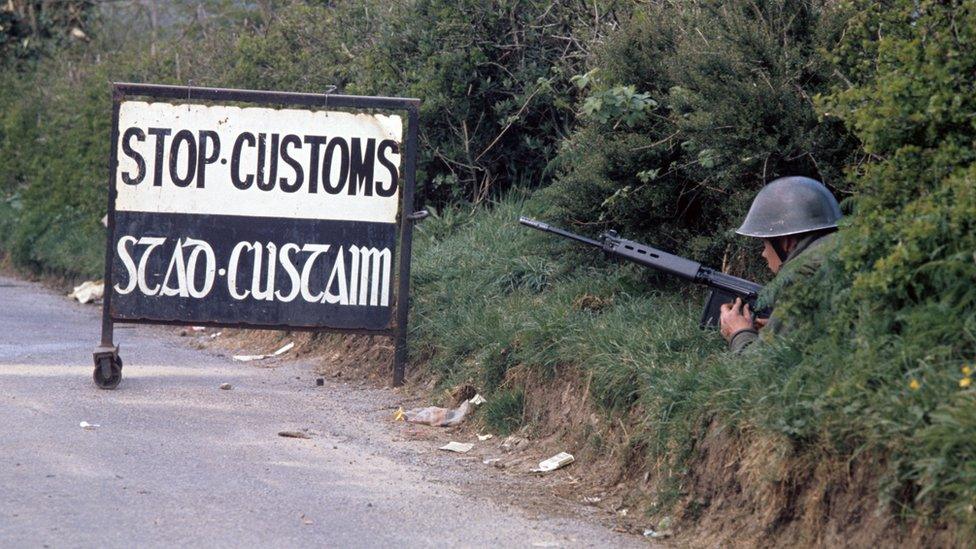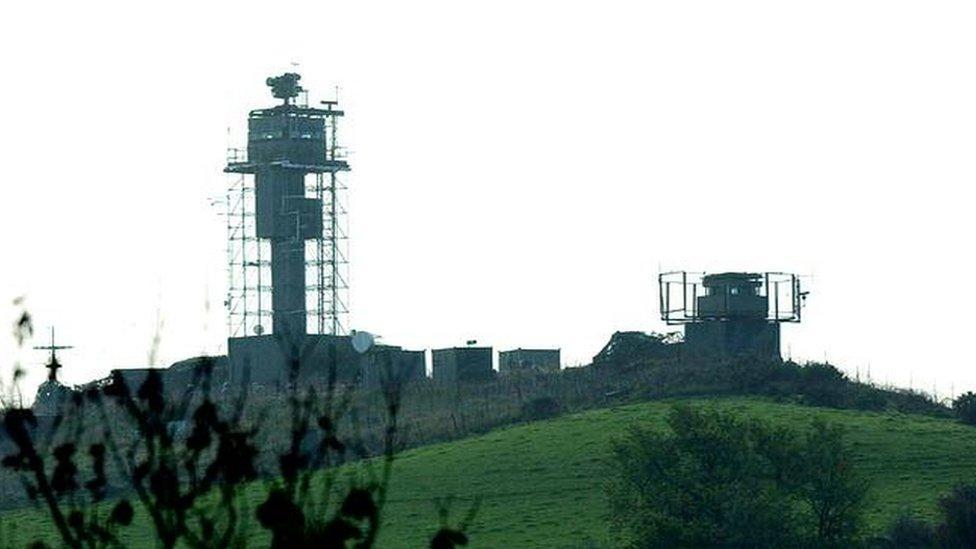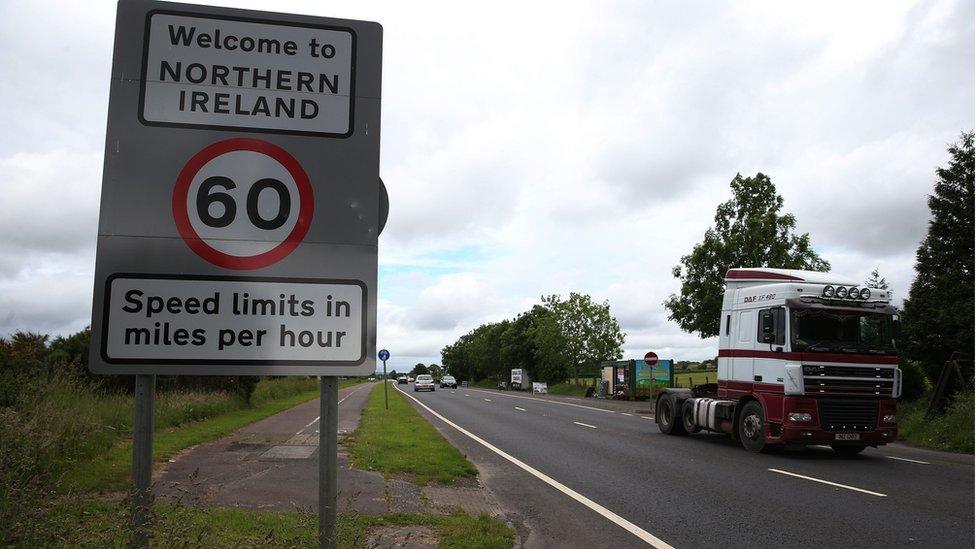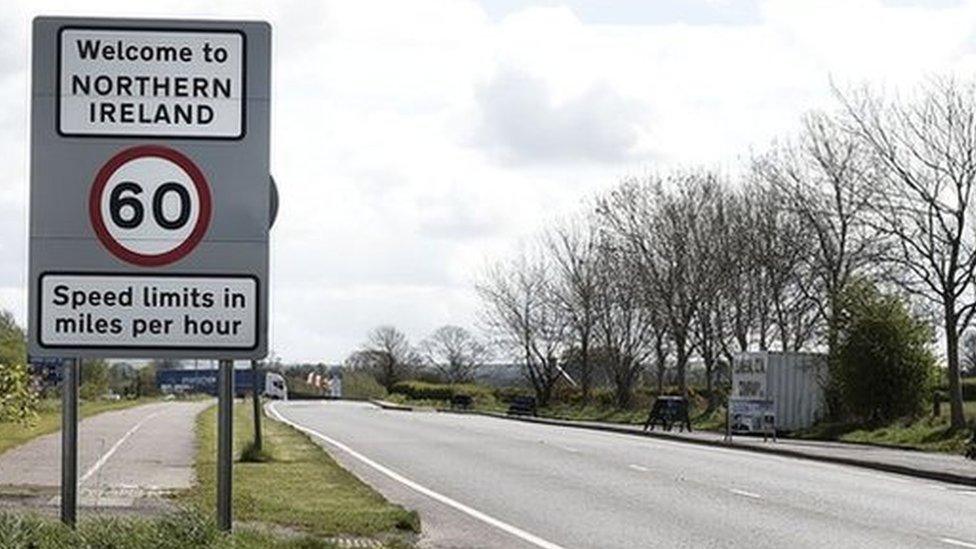Brexit paper: No Irish border tariffs for small firms
- Published

An Irish soldier guards a customs post on the southern side of the border at Swanlinbar, County Cavan, in the mid-1970s
If the vote for Brexit represented UK voters symbolically pulling up the drawbridge to Europe, then the 310-mile land border which divides Ireland always represented a headache.
It has hundreds of crossing points and the removal of the fortified border checkpoints which used to monitor north south traffic is seen as one of the lasting achievements of the peace process.
Re-creating "unapproved crossings" or putting those physical posts back to police a new customs regime would be a security nightmare, providing a focal point for dissident republicans intent on reviving the "Troubles".
So it was no surprise that the latest UK paper, external made good on previous pledges of "no return to the borders of the past" by promising there should be no physical infrastructure installed on the border.
What was surprising is that rather than installing unobtrusive CCTV cameras set back from the border, the UK wants to a large extent to have no customs border at all.
UK government and Customs officials argue that 80% of Northern Ireland firms are small or medium sized engaging in local trade within an established local market. Their proposal is to leave them alone with no requirement for new bureaucracy.

The removal of security bases on the border between Northern Ireland and the Republic of Ireland was seen as one of the major achievements of the peace process
Where the technology might come in would be for the bigger established traders declaring online their imports and exports.
Officials acknowledge some may try to abuse any Northern Ireland exemption, but reckon the chances of this distorting international trade flows are manageable and low risk.
The question is will the EU buy this? The UK lauds the EU's role in bolstering the Northern Ireland peace process and proposes that EU peace funding could continue for Northern Ireland and the Irish border counties after Brexit.
But Sinn Fein's Michelle O'Neill reckons the UK is using the peace process as a bargaining chip in the Brexit negotiations. She predicts the EU will reject the "deluded, untested and unrealistic" plans.
Farming on the border
By contrast, the DUP's Sammy Wilson welcomes the proposal to exempt small businesses from new customs tariffs arguing that the EU has previously entered into waiver arrangements for Cyprus, Croatia and Bosnia.
The EU Commission says it will study the UK plans carefully, reiterating that it is "essential" there's a "political discussion" on the issue of Ireland and Northern Ireland "before looking at technical solutions".
As one of the EU's 27 remaining members, the Irish government response will obviously prove vital.

Currently, there is very little physical evidence of the border between Northern Ireland and the Republic of Ireland
The Irish Foreign Minister Simon Coveney has expressed his support for the principle of maintaining a frictionless border. But he is also concerned about a lack of detail on how the UK's plans for trade, especially in the vital agri-food sector will work in practice.
Within Northern Ireland the focus has been on trade, as it's long been assumed it would be unrealistic and politically unacceptable to introduce any impediment to the movement of people north and south.
One road crosses the border four times in 10 minutes, but can you spot where the crossings are?
As expected the latest UK paper looks forward to a continuation of the British Irish Common Travel Area which enables British and Irish citizens to live and work in each others' states without having to obtain permission.
Immigration isn't addressed in detail in the latest paper, but if the government introduces a stricter regime post Brexit, could Northern Ireland become a "back door" to the UK?
Just as there is no plan for physical customs posts, fixed immigration checks on the land border are ruled out. Politically it would also be unacceptable to have such checks carried out between Northern Ireland and Great Britain.
There is no proposal to stop EU citizens travelling to Ireland and then making their way via Northern Ireland into the UK. However immigration officers do operate within Northern Ireland - as in the rest of the UK - checking whether workers have valid visas and permits, and this appears to be the only way such a "back door" will be monitored in the future.
- Published16 August 2017

